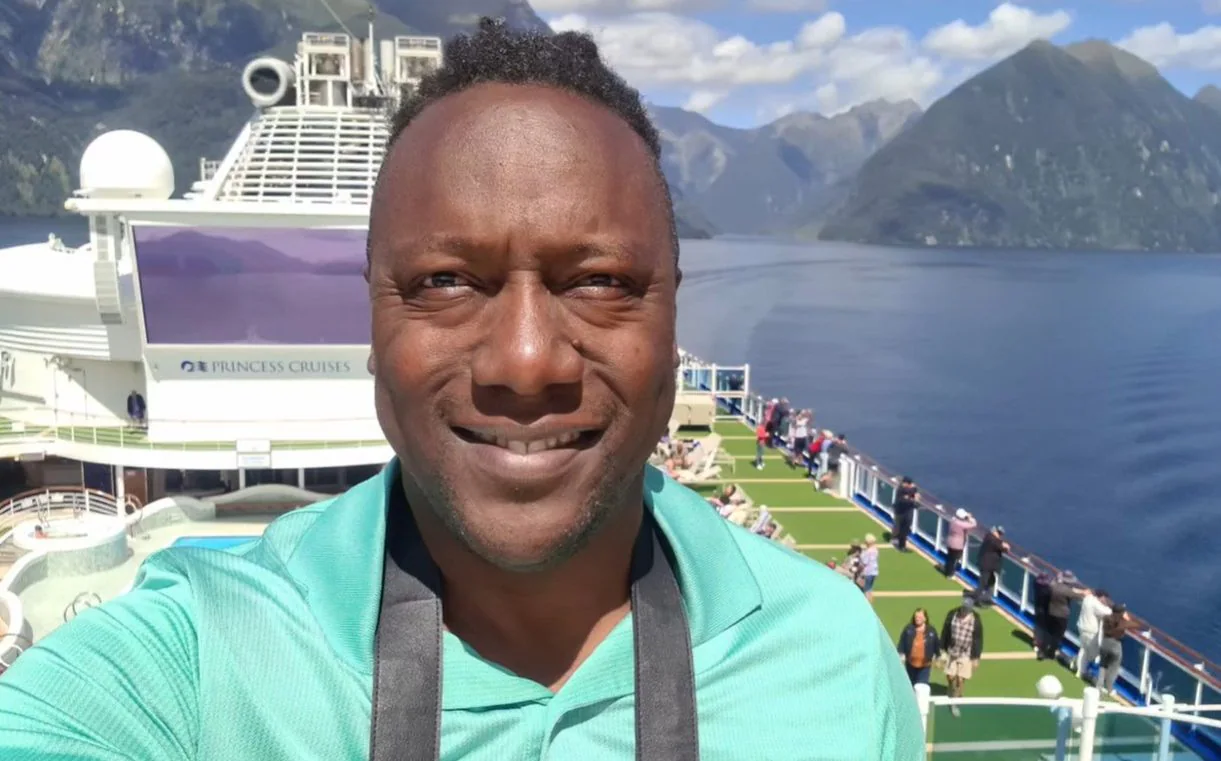Henry Olonga recites the lyrics of a song he recorded when he was a Zimbabwean cricketer at the height of his career in the early 2000s and before he was exiled from his country.
Our Zimbabwe is a patriotic, idealistic ballad, a love song to his country. It was released at a time of political violence in 2001 as the Robert Mugabe regime promoted land grabs and farm invasions.
“One of the lines goes: ‘Though I may go to distant borders, My soul will yearn for this my home, For time and space may separate us, And yet she holds my heart alone.’ And then another is: ‘As we all stand to build our nation, This our land, our Zimbabwe’.”
Olonga pauses. “Literally some of the words in that song… they speak of where my life is now but when I listen to the song again it’s somewhat
Two years after releasing the song he and Andy Flower wore black armbands during the 2003 World Cup to protest at the “death of democracy” in their country.
Olonga received death threats, was thrown off the team bus and forced to flee Zimbabwe. He has never been back. He has not seen his father, who is now in his mid-80s and still lives in Bulawayo, for more than 20 years.
“Our Zimbabwe was a call for Zimbabweans to work together. I try to be a peacemaker, a lot of people think I’m the opposite. I don’t know why, but if you look at my lyrics, if you look at things I’ve done in my life, I think generally, I’m trying to inspire people for better outcomes.
“I’m not just wagging a finger at people and that’s what the black armband protest was about; we can be better as a country we can be better as politicians, we can be better as citizens. And I got slaughtered for it.”
This week Olonga will be at Trent Bridge working as a summariser for Test Match Special during their coverage of Zimbabwe’s first Test match in England since 2003, not long after Olonga’s act of defiance. His voice is deep and sonorous, perfectly audible on a shaky WhatsApp phone line and he will make listeners sit up and take notice this week.
He is on a European holiday with his family at the moment, taking in the Test match before returning to Australia where he is now settled in Adelaide making ends meet with coaching, commentary and odd jobs as he tries to forge a career as a singer that looked to be taking off when he appeared on the Australian version of The Voice in 2019, singing This is the Moment to pass the blind audition, only to be shut down a year later by the Covid pandemic.
“It was a struggle mate,” he recounts. “I had this amazing platform, this springboard to then hopefully, you know, go on to record, and it all just came to nothing.”
He now releases music on his YouTube channel and picks up gigs where he can. Recently he was singing on cruise ships. “It’s not necessarily the peak of music performance being on a cruise ship. In fact, some people think that singers go to die on cruise ships. It’s like where you go when you haven’t made it anywhere else.
“But I don’t mind that. I don’t have an ego about my music. I sing in little retirement villages, I’ve sung to school kids, I’ve sung in little bars in front of three people. I just love singing. I love performing.
“I’ve done all sorts of jobs. I’ve cleaned people’s boats. I’ve done public speaking, as in motivational talks, after-dinner talks. I won’t say I’m having the time of my life, because I just live a sort of drab, very predictable, boring life in some people’s eyes, but at least it’s honest, and I’m staying out of trouble.”
Olonga was the first black Zimbabwean Test cricketer, and also the youngest, when he made his debut aged 18. He played 30 Tests, 50 ODIs as a quick but erratic fast bowler, peaking with five for 70 as Zimbabwe beat India in a Test in Harare (imagine that now).
He was just 27 when he wore the black armband, a protest that started at Zimbabwe’s first group game in Bulawayo and continued throughout the tournament. The backlash was vicious. A Zanu PF official called him an “uncle Tom” and a man with a “black skin and white mask.”
While Flower resettled in England, played county cricket and then coached all over the world, leading England to Ashes victory in Australia in 2010-11, Olonga’s career was over apart from games for the Lashings World XI and Bishops Lydeard in the West of England Premier League. This was a time before the franchise T20 safety net for players; Olonga had no fallback.
He says cricket was “triggering”, even just to commentate. Working as a BBC pundit after a heavy Zimbabwe defeat at Lord’s in 2003 he was sent nasty messages from Zimbabweans for being “too negative.”
While playing for Lashings in Luton a spectator spent all day shouting the C-word at him until the police were called and when he met the Zimbabwe high commissioner at an event in Australia in 2017 – nearly 15 years after his black armband protest – he was cold-shouldered.
“I’ve been accused of being scared. I’ve been accused of being a chicken; that I should have stayed in Zimbabwe. The high commissioner pulled me aside. The first thing he said was: ‘Why are you denigrating the government of Zimbabwe?’ I thought: ‘My gosh, that’s a lovely way to say hello.’
“I tried to be respectful. I excused myself but he was that old-school mentality and thought I’d betrayed the country like no one else had ever done. And so the whole cricket, Zimbabwe’s politics scene was very triggering for me because the perception was that I was a troublemaker. Does that make sense? Imagine a bad divorce and separation. And every time you think about that person, I have a conversation about them, it’s mostly unpleasant.”
‘I know I tried to make a difference’
He admits he was perhaps naive to the consequences, the repercussions that would change his life. “I’m always dealing with the fallout. I daily deal with the idea that some people view me as a guy who couldn’t just play the game, he had to bring politics into sport, and that has connotations positive and negative.
“I’ve had some unpleasant conversations, even in recent times, with Zimbabweans online or in person. They just have this beef with me. I try to deal with it gracefully, but there was a real cost attached to it. But that cost doesn’t translate to regret. I still stand by what I did. Did it make a tangible difference on the ground to anybody? Probably not.
“I was young, I had very strong feelings about what was happening in Zimbabwe with the farm invasions and the political instability, and I had a very small opportunity in a sliver of time to try to make a difference.
“I took a stance, and I know that I tried to make a difference. I could have had more time as a cricket player but it’s hard to quantify taking a moral, conscientious stance against a dictator versus runs and wickets.”
Olonga was close to returning when Mugabe, who died in 2019, was overthrown in 2017 but there was no homecoming; he remained in Australia. “It’s in the too-hard basket. I’ve started a new life. I think like a Westerner now. I live in Adelaide where things just work.
“Our government invests billions of dollars into infrastructure. We’re getting new roads put in, the hospital system is excellent, in spite of the whinging that happens. As an African my jaw is always hitting the floor at how efficient things are.
“But I feel as strongly as I did back then against the forces of corruption in Zimbabwe. If there’s any kind of vindication for us it is that Zimbabwe has gone backwards. So many people have left the country looking for opportunities abroad.
I’ve bumped into so many Zimbabweans overseas all looking for greener pastures, but doing it unwillingly. They all love Zimbabwe. They all loved living there. They would, in a heartbeat, go back if it was stable, or anything resembling the new lives they have, but they can’t do it because there’s an understanding of the instability of the country.”
He wonders if life would have turned out differently had he accepted a scholarship at the London Academy of Music and Dramatic Arts when he was teenager instead of pursuing a cricket career.
“I think I would always have been a better stage performer than I was a cricketer. I would have enjoyed it more and there would have been less failure and disaster. I’ve always felt that it would have been a more fulfilling career for me.”
‘I’m definitely a has-been now – that dream just fell flat’
Olonga readily admits it is hard to make ends meet from music. His YouTube channel has around 2,000 subscribers and when he tried to crowdfund an album last year he was hit hard by reality.
“I’m a chronically broke ex-cricketer. I thought the only way I can afford to do this, because it costs, like 200,000 Aussie dollars to record an album, is with crowdfunding.
“No word of a lie, I got nine people investing. I actually thought it was 10. And then I discovered that someone had donated twice. Nine people backed me. That was it. And then I thought: ‘Yikes. OK, I’m definitely a has-been now. That dream just fell flat.’
“It was a punch to the gut, but it was a wake-up call to make me realise how I was not even registering on anyone’s minds as worthy of backing. So I just thought: ‘Well, I’ll just do it myself. I’ll just do it through the YouTube channels with maybe 100 views per video, but as long as I get enough videos up there, maybe that’ll lead to more work elsewhere. I’ll still get my music out there somehow.’”
His voice, speaking not singing (although you can’t rule out a duet with Jonathan Agnew on his euphonium), will be heard this week on the airwaves from Trent Bridge and he says he is at peace now with cricket, that life has moved on. “I’m 49, I’m washed up. I’m over the hill. Having said that, I think I now know my instrument. I know which songs work for me. I’m an old dude trying to rewind the clock and go back to that fork in the road where I had a choice between music and cricket. I’m revisiting that music path and let’s see where it ends up.” — https://www.yahoo.com/news












